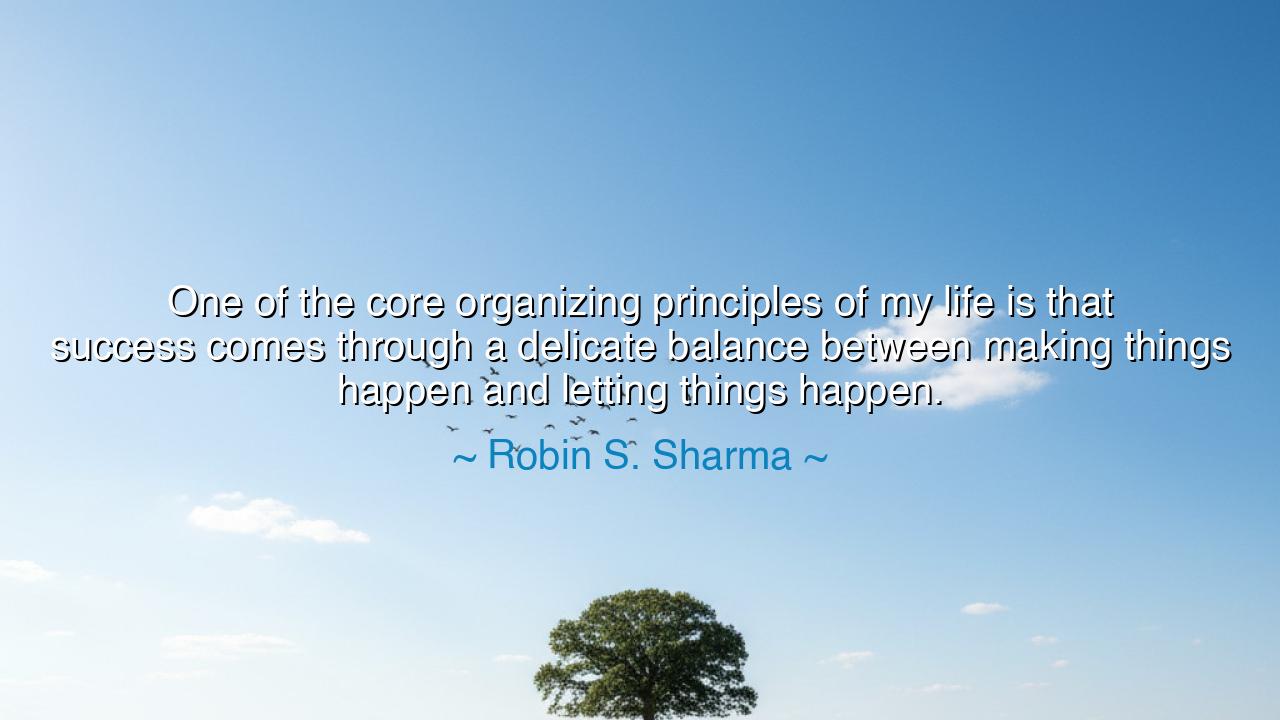
One of the core organizing principles of my life is that success
One of the core organizing principles of my life is that success comes through a delicate balance between making things happen and letting things happen.






Hear now the wisdom of Robin S. Sharma, who declared: “One of the core organizing principles of my life is that success comes through a delicate balance between making things happen and letting things happen.” These words, like a double-edged sword, reveal the eternal paradox of life: that man must strive with all his might, yet also learn to yield with grace; that he must labor with his hands, yet also trust the unseen currents of destiny. To master only one is to stumble; to unite both is to walk the path of harmony.
For to make things happen is the mark of courage, discipline, and will. It is the fire of the warrior, the drive of the builder, the resolve of the dreamer who rises before dawn to carve a future out of the stone of difficulty. But to let things happen is the mark of wisdom, humility, and faith. It is to understand that no matter how strong the hand, the river of life flows with its own course, and sometimes the greatest victories come not by force, but by surrender to timing, chance, and unseen grace.
Consider the story of Julius Caesar. With audacity, he crossed the Rubicon, defying the Senate and changing the fate of Rome forever. This was making things happen—seizing history with bold hands. Yet later, when storms threatened his ships and the winds blew against him, he could not command the heavens. He said to his crew, “Fear not, you carry Caesar and his fortune.” This was letting things happen—trusting fate to carry him where strength alone could not. His life, like Sharma’s teaching, reminds us that greatness is found not in one principle alone, but in the balance between the two.
So too in the world of invention. Alexander Graham Bell worked tirelessly to shape the telephone, a device that would transform the world. Yet in his journals, he confessed that much of his progress came through accidents, mistakes, and discoveries he had not planned. He made things happen by labor and intellect, yet he let things happen by embracing the unexpected. Thus, the union of effort and surrender birthed innovation.
The lesson for us is clear: walk in balance. If you lean only on action, you may become rigid, frustrated when the world resists your will. If you lean only on surrender, you may drift aimlessly, never shaping your destiny. But if you combine both—the discipline to act with the humility to receive—then you become like a sailor who both steers the rudder and trusts the wind. Such a one cannot be defeated, for he is aligned with the eternal order of life.
Practically, this means: set your goals, work with vigor, do all within your power to prepare the ground. But once you have planted the seed, step back and allow the rain, the sun, and the mystery of growth to do their part. In relationships, give your best effort to love and serve, but do not attempt to control every outcome—let the other soul breathe. In work, pursue excellence, but accept that timing and fortune may shape results beyond your hand. This is the secret rhythm of life: effort joined with trust.
Thus, the words of Robin Sharma stand as a beacon: “Success comes through a delicate balance between making things happen and letting things happen.” Remember this, O children of the future, and you will not be broken by disappointment nor carried away by pride. You will live as the ancients taught—active yet humble, fierce yet gentle, determined yet surrendered. And in this balance, you will find not only success, but peace, wisdom, and enduring joy.






AAdministratorAdministrator
Welcome, honored guests. Please leave a comment, we will respond soon